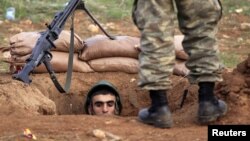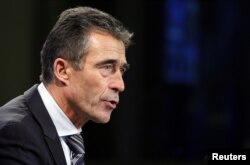BRUSSELS —
NATO foreign ministers will discuss sending a missile defense system to Turkey in response to the continuing violence in Syria. In Brussels, NATO Secretary General Anders Fogh Rasmussen said the regularly scheduled two-day ministers' meeting this week will also discuss other aspects of the Syria issue, as well as NATO's operations in Afghanistan.
Secretary General Rasmussen said the NATO ministers will discuss Turkey's request for the American Patriot missile defense system on Wednesday.
The request follows Syrian government shelling near the Turkish border that hit some areas inside Turkey. Rasmussen said the NATO ministers will also discuss the plan with Russian Foreign Minister Sergei Lavrov, who is coming to Brussels for a regular NATO-Russia dialogue meeting.
The secretary general made the remarks to visiting Afghan reporters at NATO headquarters on Monday. He said the alliance's commitment to Afghanistan will continue, even after its combat role ends in two years.
But he said the Afghan government must fulfill its commitments to the international community to improve governance, fight corruption, protect human rights - including women's rights - and to hold transparent and credible elections in 2014 and 2015.
“Our partnership with Afghanistan is a two-way street," he said. "We are taking steps to deliver on our commitment, and we expect the Afghan authorities to deliver on theirs.”
Secretary General Rasmussen said he expects Afghan security forces to be able to take full responsibility for the country by the end of 2014 as planned. He repeated that the NATO role will change to support and training only at that time. He said that will be a focus of the foreign ministers' meeting, along with ways to ensure future foreign funding for Afghan forces.
Rasmussen said the size and missions of the post-2014 NATO force have not been determined, and will not be decided until later in the planning process.
Speaking via satellite from Kabul, the Canadian general who is the deputy commander of NATO's training mission in Afghanistan said Monday that Afghan forces are already leading 80 percent of security operations.
Major General Jim Ferron said Afghan forces control areas where 75 percent of Afghans live. He said their increased combat role explains the high level of Afghan casualties, which a senior Afghan commander puts at an average of 110 per month for the Afghan Army and 200 per month for the police.
The NATO training effort has had numerous problems over the years, including a recent increase in attacks by Afghan troops on their NATO partners. But General Ferron said the vetting process has been improved and the training is back on track.
“The planning and the preparation, the training and the equipping is right now the best that the international community can provide," said Ferron. "We are doing the very best that we can to prepare the Afghan National Security Forces to sustain the lead in a very difficult combat environment.”
In addition to training soldiers and small units, the NATO effort is focusing on developing the Afghan Air Force, and the army's capabilities in heavy weapons, intelligence, and such specialties as bomb disposal and emergency response.
Secretary General Rasmussen said the NATO ministers will discuss Turkey's request for the American Patriot missile defense system on Wednesday.
The request follows Syrian government shelling near the Turkish border that hit some areas inside Turkey. Rasmussen said the NATO ministers will also discuss the plan with Russian Foreign Minister Sergei Lavrov, who is coming to Brussels for a regular NATO-Russia dialogue meeting.
The secretary general made the remarks to visiting Afghan reporters at NATO headquarters on Monday. He said the alliance's commitment to Afghanistan will continue, even after its combat role ends in two years.
But he said the Afghan government must fulfill its commitments to the international community to improve governance, fight corruption, protect human rights - including women's rights - and to hold transparent and credible elections in 2014 and 2015.
“Our partnership with Afghanistan is a two-way street," he said. "We are taking steps to deliver on our commitment, and we expect the Afghan authorities to deliver on theirs.”
Secretary General Rasmussen said he expects Afghan security forces to be able to take full responsibility for the country by the end of 2014 as planned. He repeated that the NATO role will change to support and training only at that time. He said that will be a focus of the foreign ministers' meeting, along with ways to ensure future foreign funding for Afghan forces.
Rasmussen said the size and missions of the post-2014 NATO force have not been determined, and will not be decided until later in the planning process.
Speaking via satellite from Kabul, the Canadian general who is the deputy commander of NATO's training mission in Afghanistan said Monday that Afghan forces are already leading 80 percent of security operations.
Major General Jim Ferron said Afghan forces control areas where 75 percent of Afghans live. He said their increased combat role explains the high level of Afghan casualties, which a senior Afghan commander puts at an average of 110 per month for the Afghan Army and 200 per month for the police.
The NATO training effort has had numerous problems over the years, including a recent increase in attacks by Afghan troops on their NATO partners. But General Ferron said the vetting process has been improved and the training is back on track.
“The planning and the preparation, the training and the equipping is right now the best that the international community can provide," said Ferron. "We are doing the very best that we can to prepare the Afghan National Security Forces to sustain the lead in a very difficult combat environment.”
In addition to training soldiers and small units, the NATO effort is focusing on developing the Afghan Air Force, and the army's capabilities in heavy weapons, intelligence, and such specialties as bomb disposal and emergency response.





